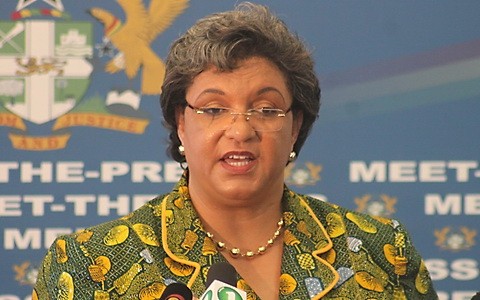adverts
Former Minister for Foreign Affairs, Hannah Tetteh, has called on President-elect John Dramani Mahama to include a comprehensive reform of the Electoral Commission (EC) in his proposed reset agenda.
Speaking on Tuesday, December 24, the former Member of Parliament for Awutu Senya West expressed deep concerns about the EC’s conduct, emphasising the critical need for reforms to restore public trust in the institution.
Tetteh’s comments come at a time when the EC’s role in ensuring free, fair, and credible elections has been widely scrutinised.
adverts
According to her, the commission’s perceived lack of neutrality and competence has eroded public confidence, a situation she believes requires urgent attention.
“The way in which they have engaged has not exactly allowed people to have confidence in their objectivity and neutrality,” Hannah Tetteh said. “I think one of the lessons for the commission after the election should be how to do a reset because if they don’t, I worry about what people’s perceptions will be of the EC’s neutrality and competence in future elections.”
Hannah Tetteh did not hold back in her assessment of the EC’s current standing, stating that public confidence in the commission is “at an all-time low.” She underscored the need for a significant review of its operations, policies, and practices to rebuild trust.
“There has to be a significant review about what [the EC] will do differently to improve public confidence,” she added.
Hannah Tetteh’s call aligns with President-elect Mahama’s broader promise of a reset agenda, which aims to tackle systemic governance issues and institutional inefficiencies.
She urged Mahama’s incoming administration to make electoral reforms a priority, stressing that a credible EC is fundamental to sustaining Ghana’s democracy.
“Electoral reforms should not be seen as an isolated issue but as a key component of the governance reset that this administration has promised. A strong, independent, and accountable Electoral Commission is essential for national stability and progress,” Tetteh noted.
Hannah Tetteh’s remarks resonate with ongoing advocacy by civil society groups, political analysts, and other stakeholders who have long highlighted the need for reforms within the EC. Proposals have ranged from structural adjustments to enhanced transparency in the commission’s decision-making processes.
As Ghana looks ahead to future elections, the former minister stressed that the credibility of the EC will be a defining factor in ensuring peaceful and legitimate outcomes.
The President-elect’s administration is expected to take office in January 2025, with the reset agenda forming a cornerstone of its governance strategy. Observers will be watching closely to see how the new government addresses Tetteh’s concerns and whether electoral reforms will be prioritised.
For many, the call for a reset at the EC is not just about addressing past grievances but ensuring that Ghana’s electoral processes remain a beacon of democracy in Africa.


